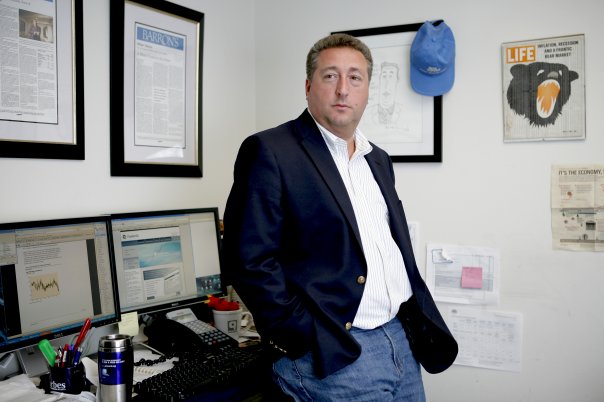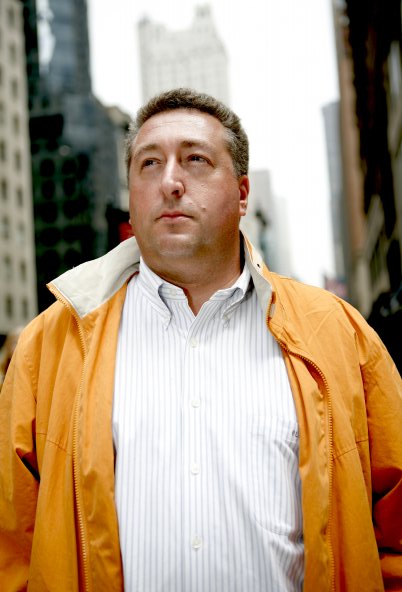This interview ran in the Australian Financial Review in June — I finally got a copy of the text and photos.
I normally hate the way I get photographed, but these came out well.
>
Bear sharpens his claws for the bail-out nation
Monday, 22 June 2009 | News | Page 53 | Anthony Hughes
http://findarticles.com/p/articles/mi_hb4692/is_200906/ai_n32077762/>
Barry Ritholtz says the US government’s rescue of the financial sector is illogical. Anthony Hughes reports from New York.
The back of Barry Ritholtz’s business card reads: “I can’t take this s— anymore, he said mistakenly.”
The line refers to his early and somewhat painful position in 2006 as one of the most bearish people on Wall Street before he was vindicated by the tumultuous events and financial markets in 2008.
The chief executive and researched rector of New York-based online quantitative research firm fusion IQ, frequent market commentator, blogger and now author, it is also a subtle dig and how many in financial markets responded to the warnings of risk.
“Anything that pointed out problems in the credit system the uncertainty of the housing boom to weakness in Derivatives was always greeted with derision,” he says.
“It was like warning the captain of the Titanic that there were icebergs, and his answer was: Well, we haven’t sunk yet!”
More than a year after the US government stepped in to rescue Bear Stearns and before, in effect bailing out the entire US financial system, or else it is, as he says, incensed by the way it was handled and the implications for the US future.
“This is just the world’s biggest theft — the world’s greatest transfer of wealth from shareholders to management and from taxpayers to companies that never should have been allowed to continue operating,” he says.
Ritholtz’s arguments and one of the themes of his new book, BAILOUT nation, is not only the policymakers didn’t regulate the banks but when the banks and the financial system cratered government failed to subject them to the normal process of handling bank failures when giving them hundreds of billions of dollars of taxpayer funds.
“If you’re bankrupt, especially if you’re a financial institution, we have a process,” Ritholtz tells the Australian Financial Review from his midtown Manhattan office.
“It’s called FDIC [ Federal Deposit Insurance Corporation] reorganization. They put you into receivership, management gets fired, the Board of Directors gets tossed out, shareholders get wiped out. What’s left is reviewed and sold to a buyer and whenever that generates goes to the bondholders and that’s it.”
Ritholtz’s problem, and something that gets him progressively angrier as he talks and writes about it, is that the US government bail out of the financial sector was simply illogical.
“Either it’s a free market and there’s no regulation and if you screw up you go out of business, or it’s a nanny state that hyper-regulates you but guarantees that you won’t go out of business. You cannot say we want to be left alone until we’ve completely screw up and then you guys have to come in and rescue us. That just doesn’t work.”
Among US commentators, it is typically difficult to divorce business and politics.
But results, a born and bred New Yorker who lives on the North Shore of Long Island, declares himself a pragmatist rather than a Republican or a Democrat.
He notes that there were bipartisan acts of stupidity. One of the worst in his mind was the late former President Ronald Reagan’s appointment of Alan Greenspan as Federal Reserve chairman in 1987 ( Greenspan’s low interest rate policy this decade is commonly blamed for creating the US housing bubble).
Then there was the Clinton administration’s repeal of the Glass-Steagall act, which separated the commercial and investment banking functions of banks, and that signing of the commodities future modernization act ( sometimes known as the bill that allowed credit default swaps two of the regulation).
Of course, there’s also George W. Bush, who Ritholtz says went AWOL last year, letting then Treasury Secretary Hank Paulson and current Fed Chairman Ben Byrne and key step into the void.
Ritholtz says Greenspan savings grace was that he was at least willing to admit he found a flaw in his ethos that the free market can regulate itself. Surprisingly, Ritholtz says that thesis isn’t actually wrong: it can regulate itself, we just won’t tolerate what happens. When Bear Stearns, Lehman and AIG went out of business, that was the market saying: “Hey, you guys are really bad at managing risk and are speculating, we are adjusting for what we think your future earnings are going to be, which is zero.”
“So the free market would’ve worked this out on its own, but if you go out and have a couple drinks too many on Friday night, on Saturday morning you wake up with a hangover. You can either suffer through it or you can take care of the dog that bit you and have a drink.” But [if you do the latter] you’re not getting rid of the hangover, you are just pushing it forward.”
Results also strongly believes that US banks became too big and too unwieldy to manage or too big to succeed, citing Citigroup as the perfect example. As unlikely as it sounds he would love to see a Put on the size of US banks.
But the really big question is: what are the long-term negative consequences of the Bailout nation?
One, results says, is that it is now very difficult for the US government to say no to corporations seeking a government rescue.
Then there is the reinforcement of moral hazard, or giving risktakers a get out of jail free card and implicitly encouraging them to do it again.
Or as Ritholtz says: “Why not crank up the risk for levels because it’s heads I win tails you lose. If we [banks] swing for the fences and hit a home run, [there’s] big bonuses for all of us and if we don’t and we lose all this money, it’s other people’s money — not my problem.”
Looking lowered, Ritholtz obviously sees more regulation and neocon administration is promising as much.
One issue is compensation, and making sure that bankers and traders are paid bonuses based on real, not fictional, profits. “What was happening was that these derivatives sales guys were getting paid on the volume of derivatives business they were doing even if the risk would be carried with the company for 30 years forward,” he says.
“It’s like selling life insurance plan but not checking the health of the person. If that’s occasionally get paid if the guy lives for 30 years now if he drops dead tomorrow.”
But one of the biggest problems, he cites, his love a lot of people went AWOL and in that he especially brackets mutual funds.
“The everyone got spoiled during the war market in the 8019 80s and 1990s. Who cares if the CEO was getting 400 times with the guys the bottom of the pay scales is getting? The stock market’s going higher so everybody’s happy. That’s the line in the movie caddy shack: Hey everybody, world to get laid!”
Ritholtz would like to see all mutual funds have corporate government officers monitoring monitoring their investments and seeing compensation consultants — he calls them weasels in the worst of all paid whores — reined in.
“They basically got paid to tell the board what they wanted to hear — look, we need someone to cover our asses because we are going to pay the CEO way too much money. They would give [the board] a white paper that explain why this egregious theft is not only allowable but as good — total, total weasels.”
On the other hand, results doesn’t begrudge people who have truly added value to the company being paid the big dollars — into that category he puts people such as Apple boss Steve Jobs and even highly successful hedge fund managers such as John Paulson and Jim Simons (Ritholtz studied in the Stony Brook University mathematics department with a Renaissance technologies boss once taught).
Although Ritholtz’s clients have made good money in the recent rebound in US stocks, he remains skeptical of the economic green shoots that have stirred investors hopes of late.
But one problem is working out what sector is now believe the US economy and the sharemarket to new heights. Ritholtz, whose portfolios are stuffed with 40% — and a mixture of semiconductor software Internet gaming and machinery stocks, insists it won’t be financial stocks.
“[In banking] there’s going to be less leverage, is going to be less opportunity for fast and easy profits. Maybe there will be less competition,” he says.
“It’s the old 363 model — the old joke used to be that you borrow at 3% landed 6% and be on the golf course at three o’clock — and I suspect we are going to revert back to that.”
Cramping the recovery, not only is the banking industry less profitable but the all whole US economy has been downsized, whether it be in retail housing or car sectors.
“The panic part, the freefall, is over,” says Ritholtz.
“We now open a parachute, but was still falling, but at a more measured and controlled pace. But we certainly haven’t hit the ground yet and we sure as hell aren’t going up.
>
Terrific interview — and probably the best still photos I have ever taken.






What's been said:
Discussions found on the web: